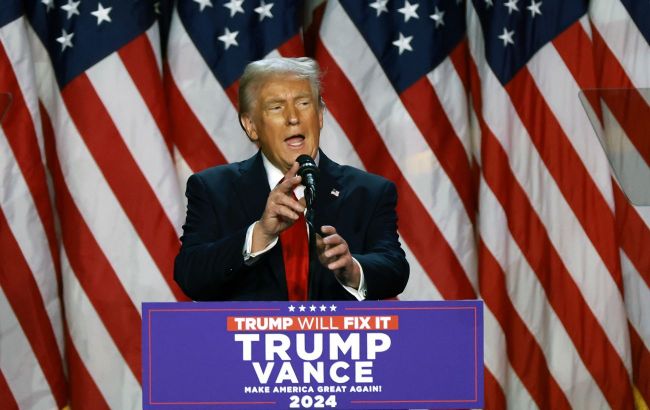From oil to electric cars: How Trump's victory will affect energy sector in US and Europe
 Photo: US President-elect Donald Trump is preparing to shake up energy policy (Getty Images)
Photo: US President-elect Donald Trump is preparing to shake up energy policy (Getty Images)
Donald Trump's victory in the US presidential election promises changes in energy policy. Which will have large-scale consequences that go beyond the American continent.
RBC-Ukraine's article provides more information about how Trump's policy may affect the energy sector in the US and Europe.
Contents
- How Trump's victory will affect US energy sector
- How Trump's approaches assessed by international experts
- What Trump's energy plans mean for Europe
How Trump's victory will affect US energy sector
The victory frees Donald Trump's hands to pursue what he calls a "green new scam" climate policy while focusing on increasing oil production and building new power plants.
Although some efforts will likely face difficulties in Congress (many Republicans will oppose the elimination of energy tax breaks), the new president will have exceptional powers to implement other changes. Oil and gas companies are expected to be the main beneficiaries.
“You are looking at, overall, a ‘drill baby drill’ philosophy. You are going to see offshore lease sales, you are going to see pipelines move much quicker, you are going to see fracking on federal lands and a mindset that is focused on lowering energy costs for consumers,” said Dan Eberhart, CEO of Canary LLC, an oilfield services company.
Bloomberg cites some of the expected changes.
Electric cars. Trump's advisers have already prepared a decree requiring the Environmental Protection Agency to review the previous administration's requirements that forced automakers to produce more electric and hybrid models.
Rapid changes are also being lobbied for by oil industry advocates to limit tax incentives for electric vehicles. This involves revising the "leasing loophole" policy, which exempts commercial electric vehicles leased out from restrictions on the place of production, the source of battery materials, and the amount of income of buyers.
Oil and gas. Trump has promised to "unleash American energy" and said he has plans to “free up the vast stores of liquid gold on America’s public land for energy development.” This is a signal of a move away from the restrictions on production in federal lands and waters that were in place under Joe Biden. Such as the smallest plan for the sale of oil and gas leases (only three auctions in five years) and a ban on drilling in Alaska.
LNG exports. Trump's victory is likely to mean the end of Biden's moratorium on large-scale liquefied natural gas exports. This could take the form of an executive order directing the Energy Department to resume reviewing applications for exports to key Asian and other non-FTA countries.
Offshore wind farms. It remains to be seen how the next president will regulate the nascent industry. But he has previously criticized the potential impact on birds and whales. He is expected to suspend the issuance of permits for new projects. If such a moratorium is introduced administratively, it will be difficult to challenge in court.
Tax incentives for clean energy. Under the new administration, the Ministry of Finance is expected to revise the rules on which projects and companies are eligible for the incentives to make them more difficult to obtain.
Coal-fired power plants. The president-elect has repeatedly promised to end rules that encourage the closure of coal-fired power plants. According to him, rising demand means that the US needs to build more plants, not close them. Trump also hinted at the prospect of using emergency measures to speed up the construction of new plants.
“To achieve this rapid reduction in energy costs, I will declare a national emergency to allow us to dramatically increase energy production, generation and supply,” he said at an August rally in Michigan.
How Trump's approaches assessed by international experts
Trump is known for his climate skepticism and promises to stimulate fossil fuel production and limit spending on the green economy. He has called climate change "a big hoax" and has spoken negatively about wind power and electric cars. His return to the White House poses a serious threat to the planet if he undermines efforts to curb global warming, international experts warn.
“The election of a climate denier to the US presidency is extremely dangerous for the world,” says Bill Hare, senior researcher at Climate Analytics, a Berlin-based non-governmental organization. In his opinion, the goal of the Paris conference to prevent global warming by more than 1.5 degrees now seems less achievable.
Trump's policy is likely to be the topic of behind-the-scenes discussions at the COP29 climate conference, which starts this week in Baku. Especially the prospect of deteriorating relations with other major carbon emitters such as China.
“The nation and world can expect the incoming Trump administration to take a wrecking ball to global climate diplomacy,” said Rachel Cleetus, policy director at the Union of Concerned Scientists.
In his previous term, it took Trump several months to withdraw the United States from the Paris Agreement. At the time, it seemed that the agreement might collapse altogether. But the countries managed to avoid this fate before Joe Biden returned to the agreement. And there is some optimism that the “green transition” is not something that Trump can reverse, writes The Guardian.
Today's context is very different from 2016, explains Laurence Tubiana, Director General of the European Climate Foundation and a key architect of the Paris Agreement.
“There is powerful economic momentum behind the global transition, which the US has led and gained from, but now risks forfeiting. The devastating toll of recent hurricanes was a grim reminder that all Americans are affected by worsening climate change,” she said.
Regardless of what Trump says, the transition to clean energy cannot be stopped and America will not turn back, said Gina McCarthy, a former Biden climate adviser. According to her, the coalition of concerned states, America Together, has bipartisan support and is ready to advance climate ambitions.
Environmental groups inside the US will try to unite Democrats and some Republicans to oppose Trump's intentions to weaken rules for coal-fired power plants, the auto industry, and well drilling.
“President Trump will face a bipartisan wall of opposition if he attempts to rip away clean energy incentives now,” said Dan Lashof, director of the World Resources Institute.
What Trump's energy plans mean for Europe
European policymakers have spent months preparing for a possible Trump return to the White House. But no one still knows how the Trump show restart will unfold, particularly in energy matters, Politico notes.
The energy policy of “drill, baby, drill” with the promise to increase oil and gas production and exports is encouraging for the industry. Despite the fact that US natural gas exports reached a record high last year, Trump wants to lift the moratorium on new LNG projects. And thus remove the restrictions that create uncertainty for the European market.
Some in his camp want him to repeal the Inflation Reduction Act (IRA), which allocates more than $500 billion for clean technology, green hydrogen, and renewables. But the program has created jobs in key states and lured businesses away from Europe, putting the US ahead of the curve in wind, solar, and electric vehicle development.
The repeal of the law could be a boon for the European Union as Brussels aims to compete with the US. Unlike the climate aspect.
According to forecasts, under the Trump administration, the pace of the green transition will slow down rather than accelerate. Since the US accounts for more than 10% of global emissions, any change in this policy will have global consequences. A planet that is too “warm” means more natural disasters, including in Europe.
Financing climate action in poor countries will be a hot topic at COP29 in Baku. Many hope that with Trump's victory, the EU will step up and fill the leadership vacuum. But without US support for much-needed reforms to address the problems in debt-laden developing countries, it will be difficult to find the funds to move away from fossil fuels.
The European Union's strategy to address these consequences should have three pillars: global climate action; energy policy and competitiveness; and investment in clean technologies. Fortunately, this approach largely coincides with its own interests, according to the Bruegel think tank (Brussels, Belgium).
In response to a possible US withdrawal from the Paris Agreement, the European Union should promote its decarbonization program, setting an example at the global level. This will increase economic competitiveness and open up opportunities for clean technology exports.
Donald Trump wants to make the United States not just energy independent but also energy dominant. He promises to halve gas and electricity prices in a year. This will widen the gap in energy prices between the US and Europe, further undermining the EU's competitiveness. However, the structural solution to the problem of high prices in the European market is still the green transition, which should be accelerated.
Sources: Bloomberg, The Guardian, Politico, and Bruegel think tank.

